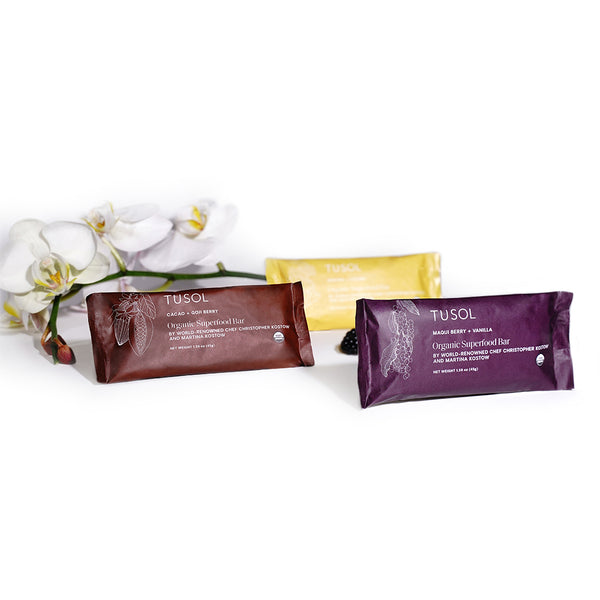What is Ashwagandha?
Ashwagandha is a small evergreen shrub found in India, the Middle East, and parts of Africa. While the official species name is Withania somnifera Dunal, it's also known as Indian ginseng, poison gooseberry, or Indian winter cherry.
The roots of ashwagandha smell like a horse or "ashwa", and it is claimed that taking it gives you the vigor and power of a horse. This herb is popularly used in the Indian Ayurvedic system as a rasayana, an herb that rejuvenates and promotes a youthful physical and mental state, due to its wide-ranging health benefits and adaptogenic activity.
What Are Adaptogens?
Put simply, adaptogens help us handle stress. Work, studies, financial obligations, illnesses, emotional problems, natural disasters, violence, and unanticipated events are life events that cause stress. Stress is a normal response to change, but it can contribute to various illnesses when it is protracted or chronic. These are not only psychological effects: oxidative stress causes direct damage to the cellular components of our bodies.
Strategies such as regular exercise, a nutritious diet, mindfulness practices, and getting enough sleep, are fundamental to develop resilience so stress does not become too overwhelming. But sometimes, it's useful to have a helping hand. And that's where adaptogens come in.
Adaptogens are herbal pharmaceuticals that also help our bodies combat stress. These are non-toxic plants, the leaves and roots of which have been used in traditional medicine for centuries. They naturally improve quality of life, relieving stress, improving concentration, increasing energy levels, and increasing immunity.
The Role of Ashwagandha as an Adaptogen
Ashwagandha is one of several adaptogens used in complementary and alternative medicine. Medically reviewed studies found that ashwagandha has adaptogenic properties: it builds stamina and helps fight stress-related conditions. Research has shown that the adaptogenic effects of Withania somnifera, or ashwagandha root extract at high concentrations, improves a person's stress resistance.
Traditional Uses of Withania Somnifera (Ashwagandha)
Ashwagandha, a rasayana (rejuvenator) of Ayurveda, has been used since 6000 BC. The root, leaves, seed, and flower extract or powders are used to treat a number of health conditions in Ayurvedic medicine.
Roots
The root is commonly used in a variety of ways: to promote children's growth and weight gain; to reduce colic, pimples, boils; to reduce old age debility; to relieve rheumatism, insomnia, and constipation; to avoid nervous breakdown; as anti-snake or scorpion venom.
Roots are either crushed and mixed with water for joint problems and ulcers, combined with other drugs for snake and scorpion bites, or powdered to achieve the maximum effect.
Leaves and Flowers
The leaves are used for fever and swellings while the flowers are used as an astringent, a depurative, a diuretic, and an aphrodisiac. Withania somnifera leaves have also been used for their anti-cancer properties; it is now known that this is due to the withaferin A compound they contain.
Seeds
The seeds have multiple uses. On their own, they are anthelmintic. When combined with astringent and rock salt, the seeds can be used to reduce anxiety, hysteria, and memory loss.
What Does Modern Science Have To Say?
There have been numerous animal studies and human studies into the effect of Withania somnifera on health. Scientifically, the most reliable of these studies are randomized, double-blind, placebo-controlled clinical trials. Here is an overview on ashwagandha through the lens of modern medicine.
Ashwagandha may reduce blood sugar levels
Research shows ashwagandha increases insulin production and improves the way the body responds to insulin. This leads to healthier blood sugar levels and could be a defense against type-2 diabetes.
Ashwagandha may improve fertility in men
The Ayurvedic use of ashwagandha for its reproductive effects also has a scientific basis. Research has shown that ashwagandha, taken at 5g per day, increases sperm count and corrects hormonal imbalances in infertile men.
Ashwagandha helps build muscle mass and strength
Several human studies have concluded that daily ashwagandha can improve muscle strength and tone. making it a useful supplement for resistance training.
Ashwagandha may reduce cholesterol
By lowering cholesterol and triglyceride levels, ashwagandha root extract may be a complementary product to enhance heart health and cardiorespiratory endurance.
Ashwagandha may improve chronic stress, reduce cortisol levels and relieve anxiety
When we are stressed, our adrenal glands produce cortisol. Studies show that increased cortisol levels over a long period of time are strongly related to obesity and anxiety. The adaptogenic activity of Withania somnifera can help reduce serum cortisol levels. Ashwagandha root extract improved stress-resistant capability, in turn helping us resist stress and anxiety. This can help control body weight in stressful situations.
Ashwagandha boosts the immune system
Ashwagandha may have a double-pronged approach to supporting the immune system. Several studies suggest that ashwagandha acts as an anti-inflammatory, reducing inflammatory markers like C-reactive protein in the blood. Other research demonstrates that ashwagandha activates immune cells to fight infection.
Ashwagandha may boost brain function, memory, and cognition
Studies suggest that ashwagandha can improve brain function and the nervous system. In particular, there are benefits relating to immediate and general memory, executive function, sustained attention, and information-processing speed.
In a double-blind, randomized, placebo-controlled study of 20 healthy males, 250mg capsules of ashwagandha twice a day for two weeks was enough to raise their cognitive and psychomotor function.
Ashwagandha also helps with neurodegenerative diseases because it contains compounds that mimic gamma-aminobutyric acid (GABA), which is a key messenger in the brain. It may help people suffering from Parkinson’s, Huntington’s, and Alzheimer’s disease.
How To Take Ashwagandha Root Extract
Ashwagandha extract comes in different forms: powders, elixirs, pills, and capsules. Studies have shown that Withania somnifera root extract is well-tolerated and safe, but it’s still wise to know the recommended safe concentration.
The standard dosage of ashwagandha powder is 600 mg/day, but the dosage varies depending on why you’re taking it. For example, 500-600 mg of ashwagandha daily is commonly used to decrease anxiety, but doses as low as 250 mg per day can also significantly reduce stress levels. For fertility effects, improved sperm quality has been demonstrated with a higher dose of 5 grams daily.
Possible Side Effects of Ashwagandha (Withania Somnifera)
Although studies have examined the benefits of ashwagandha, the long-term effects are unknown. Recent research focusing specifically on side effects, involving a randomized, double-blind, placebo-controlled human study, did not identify any adverse effects. However, previous studies have reported side effects including upset stomach and vertigo.
People with hypertension, high blood sugar, and thyroid issues should speak to their healthcare provider before taking ashwagandha. Ashwagandha should be avoided by pregnant and lactating women. If you have an autoimmune disease, such as multiple sclerosis or rheumatoid arthritis, you should also be cautious: taking ashwagandha might cause your immune system to be stimulated.
Whilst ashwagandha has multiple health benefits, we recommend that you check with your healthcare provider for medical advice, diagnosis, or treatment before using any herbal medicine for the treatment of a specific condition.
Want a Rasayana in Your Daily Routine?
There are multiple benefits associated with this ancient herbal remedy. It’s easy to appreciate why it has been so successful in traditional medicine over the years and why it is regaining popularity in today's world.
Whether you are looking to reduce stress, balance your hormones, or improve your muscle-fat ratio, our BALANCE smoothie containing matcha and ashwagandha is a positive step to achieving your goals.














